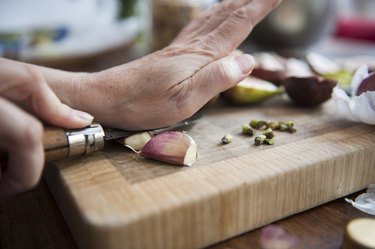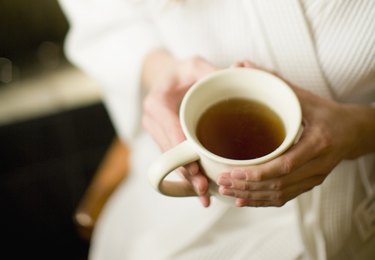
If garlic makes you gassy or a garlic-heavy meal always seems to leave you with a case of garlic farts, it's not your imagination. While this spice isn't typically the first thing that comes to mind when most people think of foods that cause gas, it can, in fact, give you a case of the rumbles.
But here's a breath of fresh air: It's possible to stave off these stinky effects without cutting out garlic completely,
Video of the Day
Video of the Day
Why Does Garlic Give You Gas?
Garlic makes you gassy because it's high in fructans, a fermentable carbohydrate also found in foods like onions, leeks, scallions, wheat, rye, inulin and chicory root. "Humans lack the enzyme to break down this molecule, and fructans are unable to be absorbed in the small intestine, where most nutrient absorption takes place," explains April Panitz, RDN, CDN, co-founder of Amenta Nutrition.
As a result, fructans travel down to the large intestine mostly undigested, where they're fermented by the bacteria that live there. It's this fermentation process that can trigger symptoms like gas, bloating and even abdominal pain, Panitz says.
All people malabsorb fructans — it's simply a feature of our digestive system. But for most folks, eating a mildly garlicky meal doesn't trigger noticeable symptoms.
"Generally, most people can have small amounts without experiencing symptoms or experiencing minor symptoms," says Panitz, adding: "It's important to remember that it's normal to pass gas about 10 to 12 times per day." (And the reason doesn't always have to do with food.)
The problems tend to start when we eat a lot of garlic at once. Add other fructan-rich foods to the mix, and it'll only make the problem worse. So if you notice a case of the toots after, say, pasta with a garlic and onion tomato sauce plus garlic bread, that's normal, Panitz says.
If you're highly sensitive to fructans, even a touch of garlic in your meal might trigger discomfort.
"People with irritable bowel syndrome, Crohn's disease, ulcerative colitis or SIBO can be prone to experiencing these symptoms even when having a small amount of fructan-containing foods," Panitz says.
What to Do If You Have Garlic Farts
Garlic-induced flatulence can be annoying, but it's not harmful.
"If fructan-rich foods like garlic make you gassy, it's not necessary to cut them out of your diet," Panitz says. "Fructans don't cause damage to our intestines or result in an inflammatory process."
In fact? Fructans are good for us. These carbohydrates are prebiotic fibers, which serve to feed and stimulate the growth of beneficial bacteria in the gut.
They also aid in the absorption of minerals and trace elements, per a November 2020 review in Clinical Nutrition ESPEN, and are integral to the production of short-chain fatty acids like butyrate, which may play a role in preventing certain cancers, according to July 2021 research in Biomedicine & Pharmacotherapy.
If the gas is embarrassing or uncomfortable, eating a little less garlic (and paying attention to your fructan intake overall) can help keep the problem in check. "Fructans are dose-dependent. It's possible that you may tolerate a small amount without experiencing symptoms," Panitz says.
Figuring out how much garlic you can eat without turning into a windmill requires a little trial and error, so pay attention to how much of the stuff you're getting at each meal and look at where you might be getting even more fructans from other foods.
"Label-reading is a must, because fructans are often added to increase the fiber and prebiotic content of many foods like cereal, protein bars, yogurt and granola," says Panitz.
And if you're planning on going big with a garlicky meal (chicken with 40 cloves, anyone?), consider taking an over-the-counter gas treatment like GAS-X, Panitz recommends. Just be sure to pop the tablet before you eat. "It won't help once you already feel gassy," she says.
Is this an emergency? If you are experiencing serious medical symptoms, please see the National Library of Medicine’s list of signs you need emergency medical attention or call 911.


